 EDITOR'S PICK
EDITOR'S PICK
Ben & Jerry’s Ditches ICE For Rivian’s Van
18 Aug 2025 | Synopsis
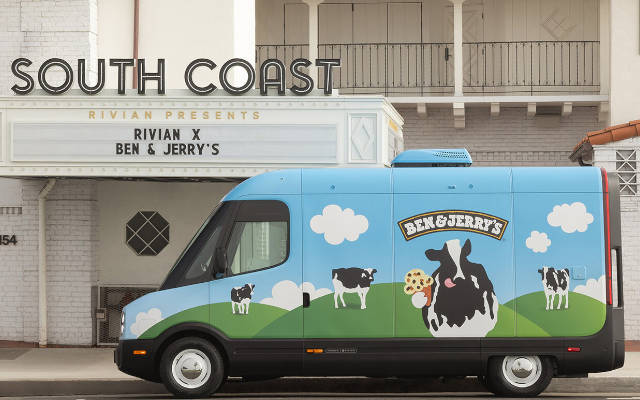 Rivian and Ben & Jerry’s have teamed up to create two all-electric "scoop trucks" built on Rivian's Commercial Van platform. Debuting at SXSW in Austin, the eco-friendly vehicles boast a 161-mile range and combine refrigeration and serving windows inside. After the launch, they'll travel nationwide...to bring scoops with less noise, emissions, and fossil-fuel reliance...showcasing Rivian's commercial EV versatility..."
Rivian and Ben & Jerry’s have teamed up to create two all-electric "scoop trucks" built on Rivian's Commercial Van platform. Debuting at SXSW in Austin, the eco-friendly vehicles boast a 161-mile range and combine refrigeration and serving windows inside. After the launch, they'll travel nationwide...to bring scoops with less noise, emissions, and fossil-fuel reliance...showcasing Rivian's commercial EV versatility..."10 Hot Electric Vehicle Deals Where Battery Range Meets Affordability
17 Aug 2025 | Synopsis
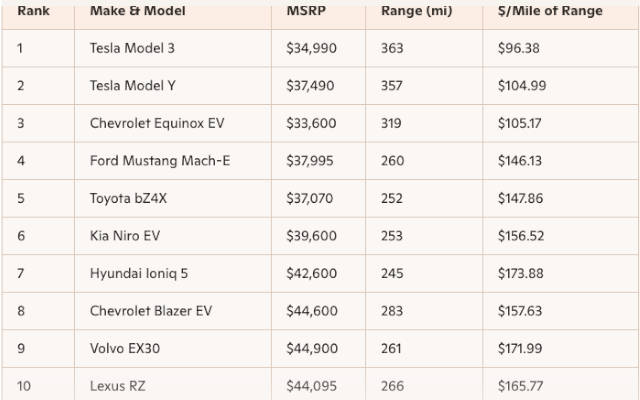 For 2025, several EVs balance affordability and range. Forbes highlights 10 models under $45K with at least 245 miles per charge. Top values include the Tesla Model 3 ($34,990/363 mi), Tesla Model Y ($37,490/357 mi), Chevy Equinox EV ($33,600/319 mi), Ford Mustang Mach-E ($37,995/260 mi), and Toyota bZ4X ($37,070/252 mi). But if you're looking for more "bang for the buck" in range, MS Copilot LLM created the above table for EVWorld.com.
For 2025, several EVs balance affordability and range. Forbes highlights 10 models under $45K with at least 245 miles per charge. Top values include the Tesla Model 3 ($34,990/363 mi), Tesla Model Y ($37,490/357 mi), Chevy Equinox EV ($33,600/319 mi), Ford Mustang Mach-E ($37,995/260 mi), and Toyota bZ4X ($37,070/252 mi). But if you're looking for more "bang for the buck" in range, MS Copilot LLM created the above table for EVWorld.com.Volkswagen Delivers The 1.5 millionth All-Electric ID. Model
17 Aug 2025 | Synopsis
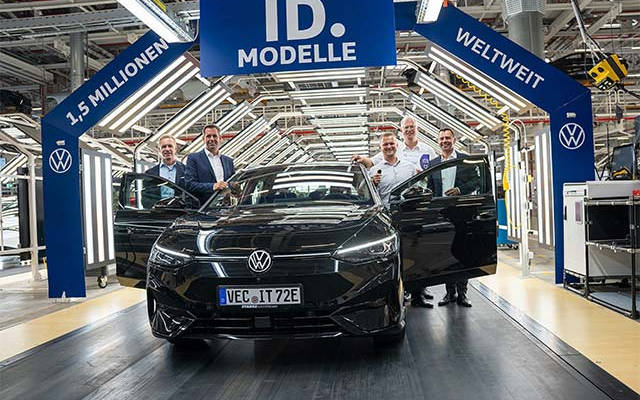 Volkswagen just delivered the 1.5 millionth all-electric ID model, a black ID.7 Tourer Pro, at its Emden plant in Germany, marking a major milestone in its electromobility push. The car, boasting a range of up to 606 km, was handed over in the presence of VW executives and Lower Saxony's Minister President. Emden - Sone of only three VW factories fully dedicated to EVs - reflects over €1 billion in investment.
Volkswagen just delivered the 1.5 millionth all-electric ID model, a black ID.7 Tourer Pro, at its Emden plant in Germany, marking a major milestone in its electromobility push. The car, boasting a range of up to 606 km, was handed over in the presence of VW executives and Lower Saxony's Minister President. Emden - Sone of only three VW factories fully dedicated to EVs - reflects over €1 billion in investment.Electric Litigation In the Air
17 Aug 2025 | Synopsis
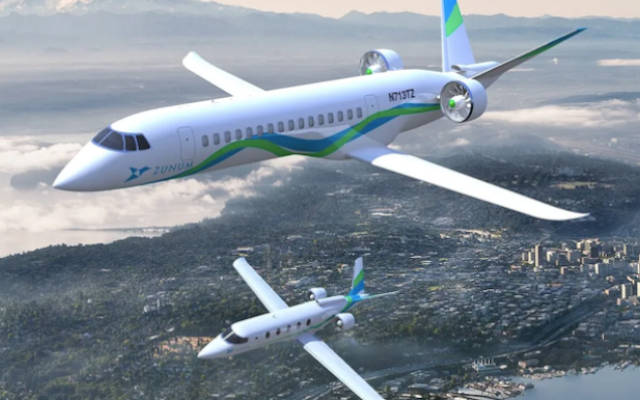 A U.S. appeals court reinstated an $81M judgment against Boeing for interfering with Zunum Aero, an electric plane startup it once funded. The ruling highlights tensions between Boeing's role as investor and competitor in advanced air mobility. Boeing's backing of Wisk Aero, which settled a trade secrets fight with rival Archer, further underscores conflicts of interest as aerospace giants shape the future of electric and autonomous flight.
A U.S. appeals court reinstated an $81M judgment against Boeing for interfering with Zunum Aero, an electric plane startup it once funded. The ruling highlights tensions between Boeing's role as investor and competitor in advanced air mobility. Boeing's backing of Wisk Aero, which settled a trade secrets fight with rival Archer, further underscores conflicts of interest as aerospace giants shape the future of electric and autonomous flight.The Italian Job : EV Startup Promised Big and Delivered Little
17 Aug 2025 | Synopsis
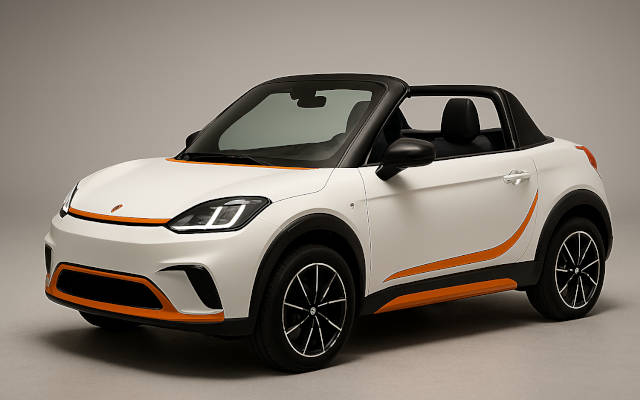 Italian EV maker Tazzari quietly continues building ultra-light city cars, while its U.S. partner Imola Automotive USA promised six factories and 45,000 jobs - but delivered none. Despite flashy renderings and bold claims, Imola has stalled, leaving towns waiting. Tazzari, though small, remains credible. The tale contrasts real innovation with speculative hype in the evolving EV landscape.
Italian EV maker Tazzari quietly continues building ultra-light city cars, while its U.S. partner Imola Automotive USA promised six factories and 45,000 jobs - but delivered none. Despite flashy renderings and bold claims, Imola has stalled, leaving towns waiting. Tazzari, though small, remains credible. The tale contrasts real innovation with speculative hype in the evolving EV landscape.
 Si Exclusive
Si Exclusive
Hydrogen's Flight Path: Fuel Cells, Turbines, and the Economics of Clean Aviation
10 Oct 2025 |  Aviation is shifting from Jet A to four fuel systems: electricity, hydrogen (fuel cell and combustion), SAF, and petroleum. Fuel cells suit short-haul aircraft; hydrogen combustion may power long-range jets. SAF bridges legacy fleets. Hydrogen costs - $5-$7/kg today, possibly $2/kg by 2040 - impact ticket prices and infrastructure decisions. Airport authorities, airlines, and governments will share deployment costs. Each fuel has distinct environmental pros and cons shaping aviation's net-zero future.
Aviation is shifting from Jet A to four fuel systems: electricity, hydrogen (fuel cell and combustion), SAF, and petroleum. Fuel cells suit short-haul aircraft; hydrogen combustion may power long-range jets. SAF bridges legacy fleets. Hydrogen costs - $5-$7/kg today, possibly $2/kg by 2040 - impact ticket prices and infrastructure decisions. Airport authorities, airlines, and governments will share deployment costs. Each fuel has distinct environmental pros and cons shaping aviation's net-zero future.
 11 Oct 2025 06:51:12 UTC |
RECENT PODCASTS
BYD Soars - Cheaper Tesla Models - The Bolt is Back - Rivian
SEARCH RSSTREAM
 48 New Postings In Past 24 Hours
48 New Postings In Past 24 Hours
Category:mobility
Region:Europe
Date:10 Oct 2025
Category:energy
Region:Global
Date:10 Oct 2025
Category:mobility
Region:SoAmerica
Date:10 Oct 2025
Category:energy
Region:NoAmerica
Date:10 Oct 2025
Category:mobility
Region:NoAmerica
Date:10 Oct 2025
Category:finance
Region:AsiaPacific
Date:10 Oct 2025
Category:policy
Region:NoAmerica
Date:10 Oct 2025
Category:finance
Region:NoAmerica
Date:10 Oct 2025
Category:mobility
Region:AsiaPacific
Date:10 Oct 2025
Category:policy
Region:NoAmerica
Date:10 Oct 2025